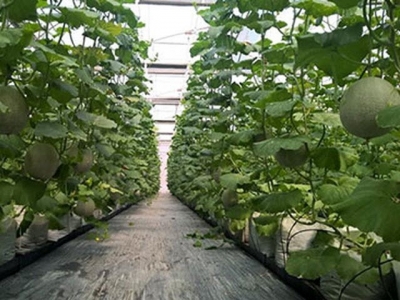City to pay interest for hi-tech farms

Using smart technologies to grow cantaloupe at the Hi-Tech Agriculture Park in HCM City. — VNS Photo
Ho Chi Minh City — HCM City will subsidise interest on bank loans by up to 100 per cent to support individuals and organisations who help transform its agricultural sector.
Resolution No 10/2017 of the city People’s Council, which seeks to encourage investment to transform the farm sector into a modern, efficient and sustainable one in 2017-20, provides for the subsidy.
The loan amount entitled to the support will be based on the investment scale and the regulations of the lending organisation.
The subsidy will be equal to the average 12-month đồng deposit interest rate at four State-owned banks -- Agribank, BIDV, Vietcombank, Vietinbank -- plus 2 per cent.
If the lending interest rate is lower than the subsidy rate, the subsidy provided will be equal to the former.
The subsidy will cover the following components: basic construction, machinery and equipment for agricultural production and processing, harvesting birds’ nest, buying new fishing vessels and upgrading machine capacity, replacing existing unproductive dairy cows, and seed and hi-tech agricultural production.
The term of support will depend on the approved production cycle but not exceed five years.
Individuals and organisations investing in growing orchids and bonsai, raising ornamental fishes, cows for dairy and meat, and aquaculture will get 80 per cent interest subsidy.
Those signing contracts for production and consumption of agricultural products, buying raw materials to develop rural areas, fishing, animal feed production, and eco-tourism will get 60 per cent subsidy.
The support term will not exceed 12 months in case of crop and livestock farming with a production cycle of less than 12 months.
If production cycles exceed 12 months, the duration will depend on the cycle but not exceed 36 months.
For consumption of agricultural products too, the support will last from 12 to 36 months.
Related news
 Developing climate-smart agriculture
Developing climate-smart agriculture Countries in the tropics and sub-tropics are particularly vulnerable as extreme weather conditions pose a serious threat to their food security.
 A new GMO technique that organic farmers will love
A new GMO technique that organic farmers will love Genetic engineering of plants can restore characteristics lost through traditional breeding.
 How to promote fruit and vegetable export to Japan?
How to promote fruit and vegetable export to Japan? Although the growth rate of fruit and vegetable export to Japan is high, the export turnover is still lower than the consumption demand of this market